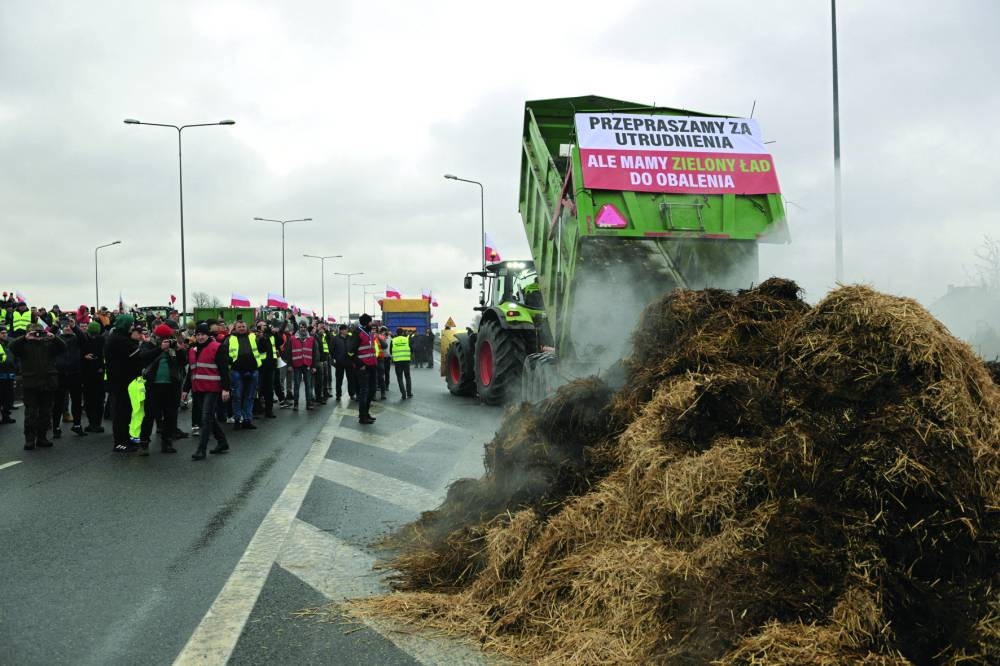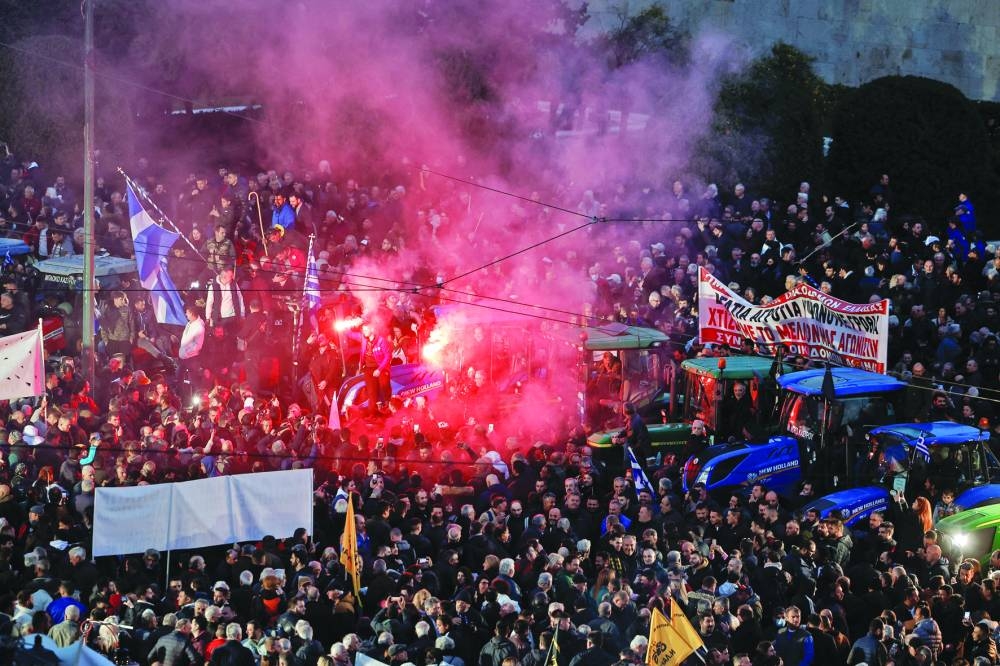Thousands of Greek farmers protested in Athens yesterday to demand financial aid, escalating a four-week showdown with a government that says it has no more funds to help.
Meanwhile, protests by Polish farmers sparked anger in neighbouring Ukraine yesterday, as Kyiv called on the European Commission to take robust action after demonstrators blockaded the border and opened railway carriages to let grain spill out.
Honking horns and waving Greek flags on dozens of tractors driven to the capital from across the country, some 8,000 farmers took part in the protest, according to police.
About 130 tractors and dozens of pickup trucks and vans parked in front of parliament on Syntagma Square.
Hundreds more were expected during the day.
“Without agricultural production, there is no future in Greece,” said one banner.
“We are here to express our solidarity with our colleagues in Europe,” said Manolis Karkadatsos, head of a farm association on the island of Crete.
Farmers began protesting last month, joining a wider movement that has seen roads blocked in France, Germany, Italy, Poland and Spain, among other countries.
Prime Minister Kyriakos Mitsotakis said the demonstration would be useful to persuade the European Union to change its agriculture policies.
“This is leverage for me as well, when I go to Brussels to negotiate,” he told Star TV on Monday.
Greek discontent is partly fuelled by anger at the slow pace of reconstruction after devastating floods in September in Thessaly, the centre of Greece’s agricultural production.
Farmers want import controls, lower fuel taxes, better prices for products and an easing of European Union environmental regulations.
Karkadatsos said the EU’s common agricultural policy was a “noose” around the necks of farmers, who should be entitled to cheap fuel under the same regulations as Greek shipowners.
“Our problems are the same as elsewhere in Europe, but in Greece, we are smallholders and production costs are enormous, especially for fertiliser and fuel,” said Giorgos Charisanis, a farmer from the northern region near Thessaloniki.
Mitsotakis, who made concessions in a meeting last week with protest leaders, stressed on Monday that the government had “nothing more to give”.
The government has offered to lower energy bills for farmers over the next 10 years, as well as to cut tax on fertilisers and animal feed from 13% to 6%.
Mitsotakis last week also promised to deliver financial aid by the end of the month to those affected by natural disasters.
Having paid farmers between €2,000 ($2,150) and €4,000 last year, the government has promised more aid worth between €5,000 and €10,000 this year.
Farmers’ unions say the aid is not enough.
On the border between Poland and Ukraine, Polish farmers protested in an escalation from previous demonstrations, with a near-total blockade of all Ukrainian border crossings and disruption at ports and on roads nationwide.
Warsaw has been a staunch supporter of Kyiv in its fight to repel a full-scale Russian invasion launched in 2022, but protests from farmers complaining of unfair competition have strained ties that were already on edge after truckers blocked border crossings around the turn of the year.
Television footage showed protesters at the Medyka border crossing opening railway carriages to allow grain to pour onto the tracks.
“The scattering of Ukrainian grain on the railroad tracks is another political provocation aimed at dividing our nations,” Ukrainian Deputy Prime Minister Oleksandr Kubrakov said in a post on X.
Ukrainian Economy Minister Yulia Svyrydenko said Kyiv has informed the European Commission of the actions of Polish protesters at the Ukrainian border and expected a robust response.
Agriculture Minister Mykola Solskyi said the grain was headed to Germany and would not have entered the Polish market.
Aside from the usual grievances expressed by farmers across Europe, farmers in Poland target what they say is unfair competition from Ukraine, after an EU decision in 2022 to waive duties on Ukrainian food imports.
Protesters’ tractors carried banners that read: “With grain flowing from Ukraine, Polish farmers will go bankrupt.”
An organiser of the protest at Doruhusk crossing, Marcin Wielgosz, said that buses would be allowed to cross once an hour, but no truck would be allowed through.
“In my opinion, the border should be closed. Procedures and systems should be clarified and then maybe it could reopen but not with the rules that we have now. Because right now you can bring whatever you want, however much you want ... into Poland,” he told Reuters.
Kyiv says its exports through eastern Europe have not damaged EU markets.
Exasperated by the Polish protests, Ukrainian hauliers began their own round-the-clock counter-demonstration at three crossings.
Their protest is planned to last till March 15.
Images circulated by media outlets showed Ukrainian trucks at the border bearing banners with slogans such as “Ukraine loses – Poland loses” and “The blockade of Ukraine is a betrayal of European values”.
Poland’s new pro-European government has expressed sympathy for the farmers’ demands but has also urged them not to take action that could damage Kyiv’s war effort.
Ukraine says the blockades are affecting its defence capability and helping Russia’s aims.
Ukrainian President Volodymyr Zelensky said on Monday that the situation at the border demonstrated “the erosion of solidarity on a daily basis”.

Polish farmers protest over grievances shared by farmers across Europe as they block roads in Elblag, Poland.

Greek farmers, some lighting flares, gather outside the parliament building with their tractors, during a protest in Athens, while on the border between Poland and Ukraine, Polish farmers block roads in Elblag, Poland.
